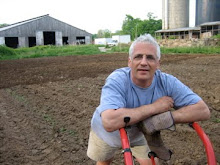
Our first official harvest, July 11, 2010, consisted of 22 cucumbers, 45 pounds of pickling cukes, 2 lbs. of dill, two green peppers, and a pound of basil. I realize, now, after seeing the animated face of an executive sous chef at a major spa resort, that our hard work is about to be rewarded. Even if we are not able to meet the complete demands of our de-facto customers, there is that nice feeling that comes from caring and succeeding.
I now realize that a half acre is a small plot, in a commercial sense. I'm excited to test the production of my tomato plants, but am aware that my spa account, alone, will be able to take all that we can grow. I'm wondering if there is still time to plant a back-up crop. Probably not.
On July 2nd, I started the following post, which I was unable to complete... due to an internet outage....after receiving some good news from The Old Mystic United Methodist Church:
"Revelations. Now that I have a neat spot to try a farm stand, I am learning that crops don't necessarily cooperate, nor do local farmers. Seems everyone has planted, down to the last ear of corn, exactly what they'll need. On top of that, the only plants of mine that are ready to sell are some half-sized green peppers and the same for the jalapenos. Of course the dill is overgrown and the basil is bushy... as for the tomatoes: The Brandywines are producing miniature crowns, and the beefsteaks, large cherries and Romas are a sea of green christmas ornaments hanging at various stages of immaturity."
After realizing that there really does not exist an immediate supply of excess local produce, short of a commute to the Hartford produce market every morning, I have decided that it

is safest for me to find wholesale accounts for my garden growth. As for my farm stand, it will have to wait, or perhaps a higher power is combining with my practical experience and is guiding me along my metaphorical garden path.
Assuming my pumpkins continue their unchecked growth, I believe that there may still be time to thank the church for their kindness and belief in me, and maybe we can stage a harvest festival in late September, early October. It's funny to look back over the past two months, to realize that no matter how old we become, we continue to grow. In the case of humans, even if our bodies have begun to age, our minds are, generally, still growing. Imagination is strong in the motivated. To meet people who support a new idea, regardless of its scale or practicality, is a precious gift. I have met a few of these people, and am grateful to each.






 to be Alternaria Canker. The first picture comes from aggie-horticulture.tamu.edu. The following picture is one I took of the suspect Beefsteak. What I am learning is that tomatoes can be infected very early. Very often the blemish or disease does not become apparent until the fruit ripens. For example, stink bugs, which thrive in weeds, can eat the green tomatoes, and only once the fruit is in its mature/ripening stage will one be able to see the true horror. The Tomato Problem Solver Site suggests that we spray a fungicide on the crop.... Any one out there have any ideas?
to be Alternaria Canker. The first picture comes from aggie-horticulture.tamu.edu. The following picture is one I took of the suspect Beefsteak. What I am learning is that tomatoes can be infected very early. Very often the blemish or disease does not become apparent until the fruit ripens. For example, stink bugs, which thrive in weeds, can eat the green tomatoes, and only once the fruit is in its mature/ripening stage will one be able to see the true horror. The Tomato Problem Solver Site suggests that we spray a fungicide on the crop.... Any one out there have any ideas?


